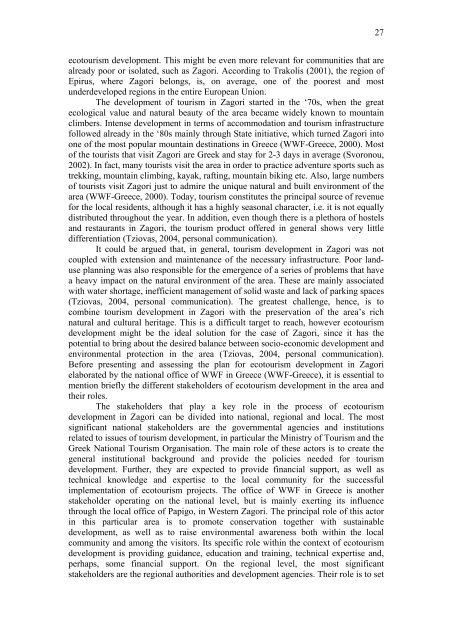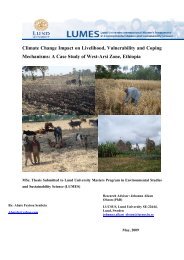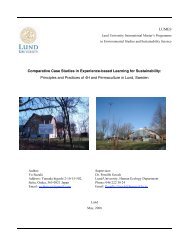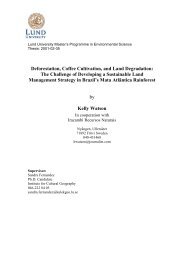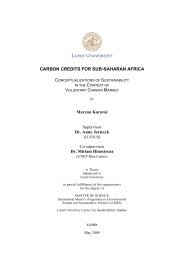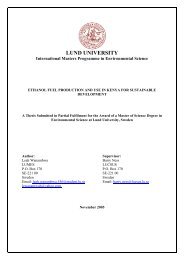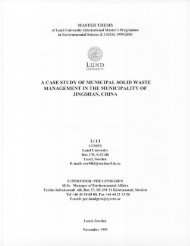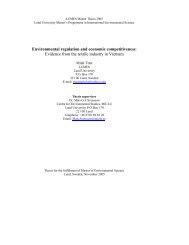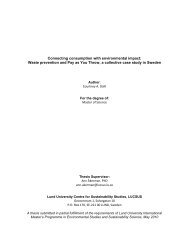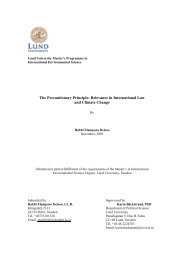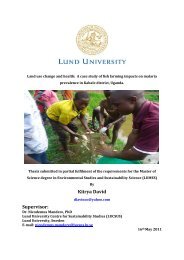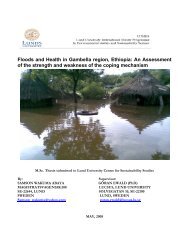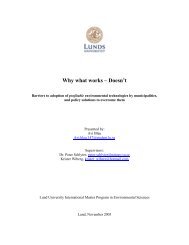Thesis title: âThe development of community-based ecotourism - lumes
Thesis title: âThe development of community-based ecotourism - lumes
Thesis title: âThe development of community-based ecotourism - lumes
You also want an ePaper? Increase the reach of your titles
YUMPU automatically turns print PDFs into web optimized ePapers that Google loves.
<strong>ecotourism</strong> <strong>development</strong>. This might be even more relevant for communities that arealready poor or isolated, such as Zagori. According to Trakolis (2001), the region <strong>of</strong>Epirus, where Zagori belongs, is, on average, one <strong>of</strong> the poorest and mostunderdeveloped regions in the entire European Union.The <strong>development</strong> <strong>of</strong> tourism in Zagori started in the ‘70s, when the greatecological value and natural beauty <strong>of</strong> the area became widely known to mountainclimbers. Intense <strong>development</strong> in terms <strong>of</strong> accommodation and tourism infrastructurefollowed already in the ‘80s mainly through State initiative, which turned Zagori intoone <strong>of</strong> the most popular mountain destinations in Greece (WWF-Greece, 2000). Most<strong>of</strong> the tourists that visit Zagori are Greek and stay for 2-3 days in average (Svoronou,2002). In fact, many tourists visit the area in order to practice adventure sports such astrekking, mountain climbing, kayak, rafting, mountain biking etc. Also, large numbers<strong>of</strong> tourists visit Zagori just to admire the unique natural and built environment <strong>of</strong> thearea (WWF-Greece, 2000). Today, tourism constitutes the principal source <strong>of</strong> revenuefor the local residents, although it has a highly seasonal character, i.e. it is not equallydistributed throughout the year. In addition, even though there is a plethora <strong>of</strong> hostelsand restaurants in Zagori, the tourism product <strong>of</strong>fered in general shows very littledifferentiation (Tziovas, 2004, personal communication).It could be argued that, in general, tourism <strong>development</strong> in Zagori was notcoupled with extension and maintenance <strong>of</strong> the necessary infrastructure. Poor landuseplanning was also responsible for the emergence <strong>of</strong> a series <strong>of</strong> problems that havea heavy impact on the natural environment <strong>of</strong> the area. These are mainly associatedwith water shortage, inefficient management <strong>of</strong> solid waste and lack <strong>of</strong> parking spaces(Tziovas, 2004, personal communication). The greatest challenge, hence, is tocombine tourism <strong>development</strong> in Zagori with the preservation <strong>of</strong> the area’s richnatural and cultural heritage. This is a difficult target to reach, however <strong>ecotourism</strong><strong>development</strong> might be the ideal solution for the case <strong>of</strong> Zagori, since it has thepotential to bring about the desired balance between socio-economic <strong>development</strong> andenvironmental protection in the area (Tziovas, 2004, personal communication).Before presenting and assessing the plan for <strong>ecotourism</strong> <strong>development</strong> in Zagorielaborated by the national <strong>of</strong>fice <strong>of</strong> WWF in Greece (WWF-Greece), it is essential tomention briefly the different stakeholders <strong>of</strong> <strong>ecotourism</strong> <strong>development</strong> in the area andtheir roles.The stakeholders that play a key role in the process <strong>of</strong> <strong>ecotourism</strong><strong>development</strong> in Zagori can be divided into national, regional and local. The mostsignificant national stakeholders are the governmental agencies and institutionsrelated to issues <strong>of</strong> tourism <strong>development</strong>, in particular the Ministry <strong>of</strong> Tourism and theGreek National Tourism Organisation. The main role <strong>of</strong> these actors is to create thegeneral institutional background and provide the policies needed for tourism<strong>development</strong>. Further, they are expected to provide financial support, as well astechnical knowledge and expertise to the local <strong>community</strong> for the successfulimplementation <strong>of</strong> <strong>ecotourism</strong> projects. The <strong>of</strong>fice <strong>of</strong> WWF in Greece is anotherstakeholder operating on the national level, but is mainly exerting its influencethrough the local <strong>of</strong>fice <strong>of</strong> Papigo, in Western Zagori. The principal role <strong>of</strong> this actorin this particular area is to promote conservation together with sustainable<strong>development</strong>, as well as to raise environmental awareness both within the local<strong>community</strong> and among the visitors. Its specific role within the context <strong>of</strong> <strong>ecotourism</strong><strong>development</strong> is providing guidance, education and training, technical expertise and,perhaps, some financial support. On the regional level, the most significantstakeholders are the regional authorities and <strong>development</strong> agencies. Their role is to set27


